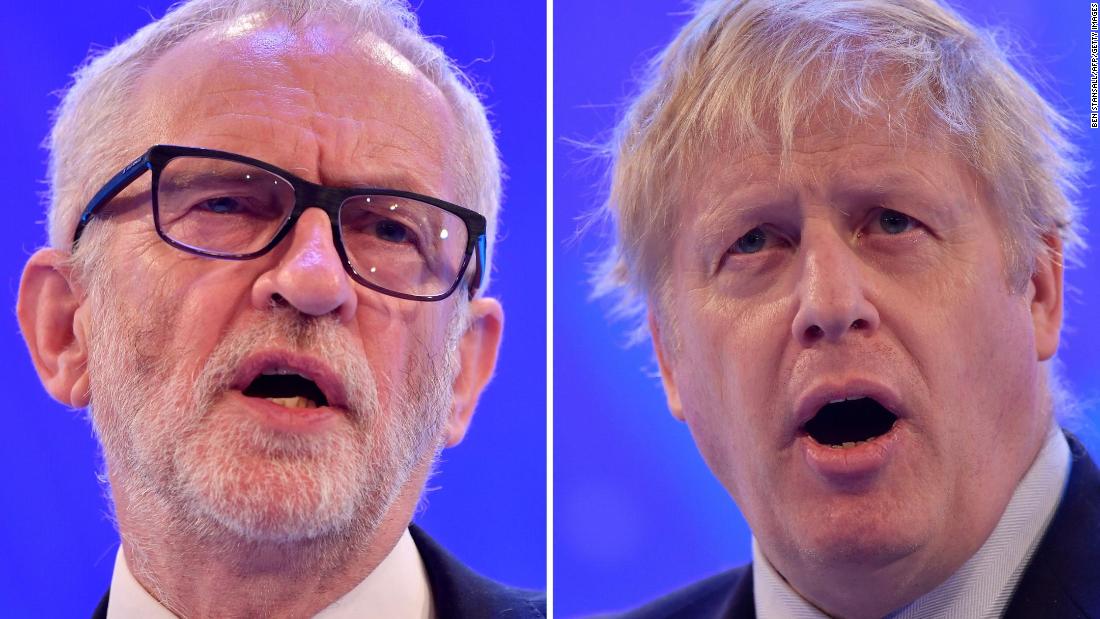
London (CNN)The UK’s general election campaign has finally had its first proper moment, as UK Prime Minister Boris Johnson and Labour Party leader Jeremy Corbyn faced each other in a head-to-head debate.
For Johnson, the aim was simple: drive home his campaign slogan of “Get Brexit Done” and show the nation that his Conservative Party will finally end three years of uncertainty.
For Corbyn, the job was more complicated. His Labour Party’s formal Brexit policy is to negotiate a new deal with the EU, and then put that to the public in a second referendum — Corbyn’s deal or Remain. Corbyn has said that he would be neutral in the campaign.
From the start, Corbyn’s weakness on Brexit was obvious. In his opening statement, he barely mentioned the single most important issue facing the country, instead focusing on the failures of nine years of Conservative rule.
This allowed Johnson to repeat his slogans and accuse Corbyn of wanting to inflict more “dither and delay on the country”.
It was an uncomfortable 10 minutes or so for the Labour leader. However, when the debate moved onto wider issues facing the nation, some cracks appeared in Johnson’s veneer.
Threats to the Union
Johnson tried to paint Corbyn as the biggest threat to the unity of the four nations that make up the United Kingdom. In order to get into Downing Street, Corbyn would likely need to strike a deal with the Scottish Nationalist Party — which could mean committing to another Scottish independence referendum.
However, this is a tricky argument for Johnson to make. Many believe that in order to get a Brexit deal out of Brussels, Johnson threw Northern Ireland under a bus and paved the way for Irish reunification — an odd thing for the leader of the Conservative and Unionist party to do.
The National Health Service
On the National Health Service, Corbyn had a chance to shine. He said that if he is elected Prime Minister, he would “end the nonsense” of privatization in the NHS. After a touching personal anecdote about a friend who recently died of breast cancer, Corbyn went on the offensive, accusing Johnson’s Conservatives of holding secret talks with the US about the possibility of putting NHS contracts on the table in any US-UK trade deal.
Johnson has repeatedly denied that this is his plan. However, perception means in a lot in politics, and there’s very little Johnson can do about the fact that the public sees his party as the one more likely to sell off parts of their health service. In the words of Nigel Lawson, a former Conservative finance minister, “the NHS is the closest thing the English people have to a religion,” and the prospect of selling it to a man as unpopular in the UK as US President Donald Trump is electoral dynamite.
Laughter from the audience
When talking about his own leadership style, Corbyn seemed sure-footed describing himself as a man who listens to people up and down the country, rather than governing by “diktat”.
He also came across well when talking about issues such as the NHS and ending austerity. However, the audience burst into laughter when he defended his record on the anti-Semitism crisis that has dogged his party for the past four years.
Johnson also suffered the humiliation of being ridiculed by the audience on the matter of his own trustworthiness. And as the evening wore on, his attempt to crowbar the phrase “Get Brexit Done” into nearly every answer started to annoy the audience. Johnson might do well to remember how frustrated the public got of his predecessor Theresa May’s equally irritating soundbite in 2017: “Strong and Stable”.
Prince Andrew
One audience member asked whether the monarchy is fit for purpose, in the context of Prince Andrew’s controversial BBC interview about his relationship with convicted sex offender Jeffrey Epstein. Given how readily both men brushed off the question, it’s likely that this issue featured heavily in their debate preparation.
Both said that before talking about the Duke of York, the priority must be to address Epstein’s victims. However, Corbyn went on to say that he believes that the monarchy could do with reform, which under normal circumstances would be a controversial answer, given the UK’s affection for its Royal Family.
In truth, this debate will have not swayed many voters. Both men played to their strengths but failed to escape their more negative caricatures, with Corbyn looking weak on Brexit and Johnson looking weak on compassion.
If their teams take anything from this exercise, it’s that both men need to look a lot more convincing in areas beyond their established strengths. And whoever figures out how to do it quicker could win the keys to 10 Downing Street.




Recent Comments